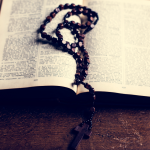While most of us go through life feeling like we don’t take our sin seriously enough, some souls suffer from scrupulosity, which is seeing sin where there actually is none, writes Kelly Cole who is a wife, mother-of-seven and parishioner at Saint Anthony in Hillsdale.
This confusion can be extremely burdensome for the sufferer and can warrant seeking out significant support physically, emotionally, mentally, and/or spiritually to be able to open oneself to God’s unconditional love.
The word scruple, as some of you may know, means “small sharp stone” in Latin. It is that little pebble in your shoe that seems so insignificant that it shouldn’t bother you, and yet you can think about nothing else because of the annoyance it causes.
Scrupulosity manifests itself in a variety of forms. Most commonly, it sees something as sinful that actually is not. This could be a fleeting impure or irreverent thought that was not intentional, but is immediately judged by the thinker to be a sin. It could be holding oneself to unnecessarily high standards for prayer or mortification — for instance, considering it a sin to miss daily Mass when we’re only obligated to attend Mass on Sundays. It could be an inability to let go of a past sin to such an extent that just thinking about that past sin is now perceived to be a current sin. The scrupulous soul fears the occurrence of sin and sees it lurking in almost all circumstances of life.
Another hallmark of scrupulosity is to consider a venial sin (if it’s even a sin at all) to be a mortal sin. Even though there is clearly no full knowledge or consent on the part of the sinner, the scrupulous person’s mind can very quickly go from questioning if something is a sin to believing it is not only a sin, but a mortal sin at that. The same is true of temptation — the scrupulous soul will often mistake a moment of temptation for an actual occasion of sin.
These cycles of doubt are another hallmark of scrupulosity. Did you sin, how “badly” did you sin, did you confess properly, did you do your penance well — this continual questioning of and unease about one’s moral state is a sign of scrupulosity. It is sometimes called the “doubting disease.”
Saint Alphonsus Liguori (1696 – 1787), the founder of the Redemptorists, whose feast day we celebrate today, suffered throughout his life from scrupulosity, writing: “Scrupulosity is one of the most bitter trials souls who love God can undergo, worse than ill-health, persecutions, and similar sufferings.”
Of course, we are supposed to be concerned about our moral state and fear sin as something that closes ourselves off from God and His grace. However, scrupulosity makes it virtually impossible to find a healthy level of concern for one’s moral state.
If you or someone you love may be suffering from this trial, please explore the resources below and know that there is help and hope for a life of peace and comfort with and through Our Lord. Saint Alphonsus became a bishop, founder of two religious orders, and a Doctor of the Church, and begs those suffering as he has to take comfort:
“Let these souls so dear to God, and who are resolutely determined to belong entirely to Him, take comfort, although at the same time they see themselves deprived of every consolation… He has for them a place prepared in His heavenly Kingdom, which overflows with consolations as full as they are lasting. And let them hold for certain, that the more they are afflicted in this present life, so much the more they shall be consoled in eternity: ‘According to the multitude of my sorrows in my heart, Thy comforts have given joy to my soul’. (Ps. 93:19)” – Saint Alphonsus Liguori.
Saint Alphonsus Ligouri, pray for us!
• The St. Alphonsus quotes are both taken from “Scruples and Sainthood” by Trent Beattie, published by Loreto Publications: https://loretopubs.org/ebook-scruples-and-sainthood…
• Other Catholic resources include the following ministries of the Redemptorists/Liguori Publications: https://scrupulousanonymous.org/ and https://managingscrupulosity.com/





